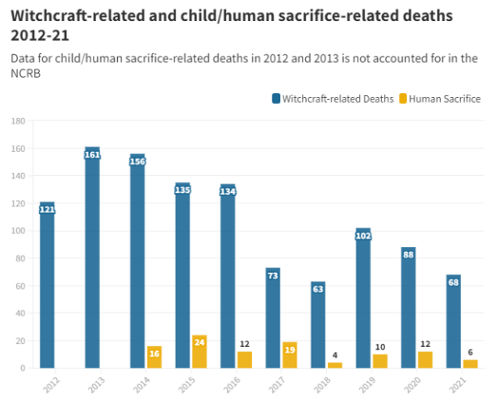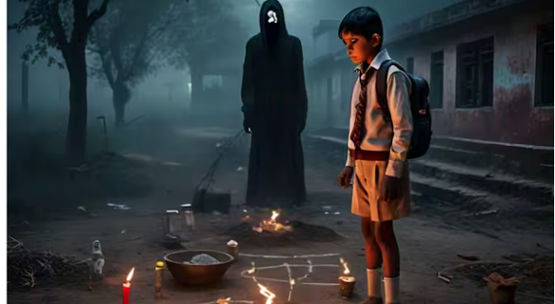INTRODUCTION
In a chilling reminder that India’s troubled past continues to haunt its present, a gruesome incident has shaken the nation. An 11-year-old Class 2 student in Hathras, Uttar Pradesh, fell prey to an alleged human sacrifice ritual, perpetuated by the very individuals entrusted with his care – the school’s owner and director.
This shocking crime, driven by superstition and a twisted quest for “prosperity”, exposes the dark underbelly of a tradition thought to be long eradicated.
The disturbing allegations, that the school’s owner believed sacrificing a child would ensure the institution’s success serve as a stark wake-up call. The resurgence of archaic and sinister practices undermines India’s progress toward modernity and enlightenment. As the nation grapples with the horror of this incident, one question echoes: Have we truly left the horrors of the past behind?
A TRADITION OF DARKNESS
Human sacrifice, or “Narabali,” has a complex and disturbing history in India. Ancient roots trace back to Vedic rituals, tribal practices, and Tantric beliefs. Notable examples include the Thuggee cult, Kamakhya Temple, and Narasimha cult, which were associated with ritual murder and human sacrifice. The British colonial era documented and condemned these practices, enacting laws to prohibit Narabali in 1840.
Despite progress, human sacrifice cases continue to surface in modern India. Superstition and ignorance persist in rural areas, fueled by black magic and occult practices. Economic and social desperation drive some to extreme beliefs.
To combat this darkness, India must strengthen laws, enhance education and awareness, support vulnerable communities, and promote rational thinking. Acknowledging this dark legacy is crucial to moving toward a brighter future.

MODERN INDIA’S UNCOMFORTABLE TRUTH
The persistence of outdated and sinister practices like black magic and human sacrifice undermines India’s rapid progress and development. Despite advancements in education, technology, and social reforms, these harmful traditions thrive.
This uncomfortable truth raises questions about the country’s ability to reconcile its modernizing aspirations with deep-seated societal issues.
The roots of this problem lie in:
- Superstition and ignorance: Limited education and awareness in rural areas fuel beliefs in black magic and harmful rituals.
- Economic disparities: Poverty and inequality drive desperation, making vulnerable individuals susceptible to harmful practices.
- Social and cultural norms: Normalization of violence and marginalization perpetuates harmful traditions.
- Weak law enforcement: Inadequate investigation and prosecution enable perpetrators.
The consequences are devastating. Human sacrifice, ritual abuse, and honor killings continue to afflict Indian society. These crimes hinder India’s modernization and growth, undermining its progress. The data is alarming as 70% of Indians believe in superstitions, and 50% of rural Indians attribute illnesses to evil spirits.
THE CASE IN QUESTION
An incident occurred in Hathras, Uttar Pradesh, where a Class 2 student was allegedly murdered as part of a black magic ritual or human sacrifice.
The crime aimed to ensure the “prosperity” of the school, which had been facing financial strain. The accused believed that offering a human sacrifice would lead to the school’s success.
The crime unfolded on September 22, when three people strangled the 11-year-old boy in his hostel room. Before this, the accused had attempted to sacrifice another boy on September 6, but the plan was foiled when the boy raised an alarm and ran away. A medical examination later confirmed signs of strangling.
Further investigation led to the discovery of ritualistic items near a tube well behind the school, supporting claims of occult activities. Five individuals, including the school owner and staff members, have been arrested in connection with the crime.
Hathras Superintendent of Police, Nipun Aggarwal, confirmed the arrests.
A CALL TO ACTION
The incident highlights the dark legacy of superstition and demands action. To combat human sacrifice, India must strengthen laws and enforcement against superstition, increasing penalties and improving investigations.
Enhancing education and awareness is also crucial, promoting critical thinking and scientific temper through schools, community centers, and media. The case serves as a stark reminder of the need to address these harmful beliefs.
Supporting victims’ families with counseling, financial aid, and legal assistance is vital. A collective effort from the government, civil society, and individuals can break the cycle of horror, ensuring a safer future for India’s children.
BREAKING THE CYCLE
We must address the root causes of human sacrifice and superstition to eradicate these harmful practices. Education and awareness are crucial in promoting critical thinking, scientific temper, and human rights.
Strengthening law enforcement is vital. Improving investigation, prosecution, and punishment for perpetrators will deter future crimes.
Economic empowerment through addressing poverty, inequality, and social injustice will reduce vulnerability. Anti-Superstition Laws such as the Anti-Superstition and Black Magic Act (2013) and the Protection of Children from Sexual Offences (POCSO) Act (2012) provide a framework for prosecution.
Encouraging community-led initiatives to combat superstition and providing support services like counseling and rehabilitation for victims’ families will foster a safer environment, such being The National Commission for Protection of Child Rights (NCPCR) and the National Human Rights Commission (NHRC).
Government, civil society, and individuals must collaborate to enact and enforce stringent laws, launch nationwide awareness campaigns, and establish community centers for education and support.
The Witch Hunting (Prohibition, Prevention and Protection) Act (2015) and the Prevention of Atrocities against Scheduled Castes and Scheduled Tribes Act (1989) are examples of legislative measures aimed at combating harmful practices.
By working together, we can protect vulnerable individuals, promote rational thinking, ensure justice for victims, and foster a culture of tolerance and inclusivity.
CONCLUSION
The Hathras human sacrifice case serves as a chilling reminder of India’s ongoing struggle with superstition and harmful practices. This heinous crime exposes the dark legacy of human sacrifice, which persists despite progress in education and social reforms.
To break this cycle of horror, India must confront its failures and take collective action. Strengthening laws, enhancing education, and supporting victims’ families are crucial steps toward eradicating this evil tradition. Only through concerted efforts can India ensure a safer, more enlightened future for its children and shatter the persistent legacy of human sacrifice and black magic.
– SHEELU KUMARI
MUST READ: LADAKH’S QUEST FOR AUTONOMY AND ENVIRONMENTAL PROTECTION: THE ONGOING STRUGGLE


